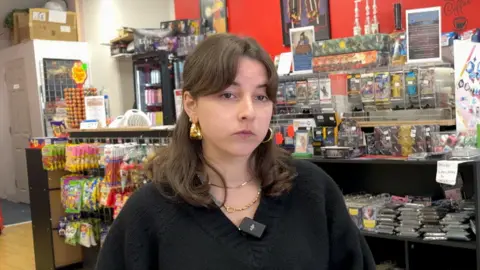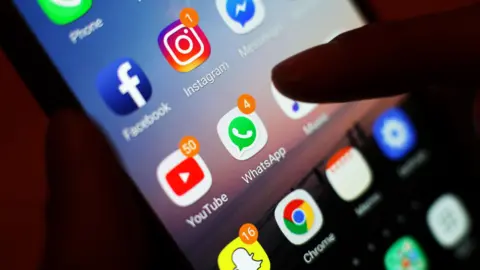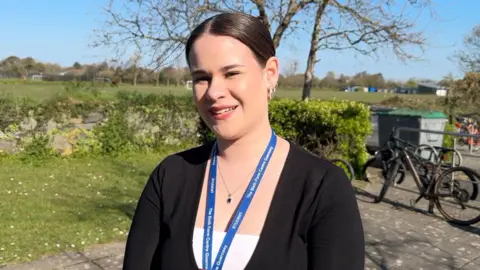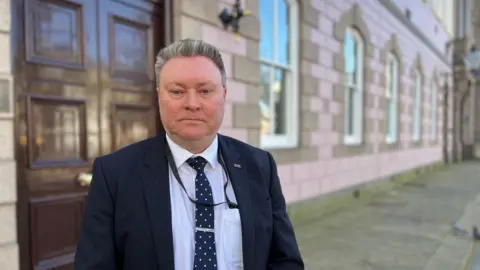'I've been scarred by social media'
 BBC
BBCA woman has spent a year without using some social media apps after realising they had "completely consumed" her life.
Marina Jennings, 20, from Jersey, said the impact of using social media since she was 12 years old had been scarring and would stay with her forever.
She said she decided to permanently delete the TikTok app from her phone, with a temporary "detox" ban on Instagram, because the platforms gave her "great anxiety".
After stepping away from TikTok, Ms Jennings said she felt lucky to have "found the root of the problem".
'A complete panic'
Ms Jennings said she was "worried about what she looked like constantly" and the apps caused "great anxiety" and affected her ability to concentrate on day-to-day tasks.
Ms Jennings first started using social media aged 12, and said that within a few days she had watched a video about a girl who developed an eating disorder.
"At that age, you have intrusive thoughts," she said.
"I was sent into a complete panic - a state of anxiety that I was going to develop an eating disorder.
"Luckily, this only lasted a very short amount of time, but it was absolutely scarring and that will stay with me forever."
 PA Media
PA MediaShe said her friends would edit their bodies in photographs since they were around 14 years old.
All group photographs had to be "approved" and her friends would delete her pictures without asking if they did not like how they looked.
"It was just so self-centred. I just watched everyone around me just think about what they look like and it was really heart-breaking to watch, especially at such a young age," she said.
She said being bombarded with unrealistic photographs of how everyone looked made her feel very "insecure".
"It completely consumed my life," she added.
What are the facts?
The recently published Jersey Children and Young People's Survey shows that:
- 63% of year six pupils own a smartphone
- 96% of year eight pupils own a smartphone
- 100% of year twelve pupils own a smartphone
Amongst its other findings, the survey found that 51% of year 12 girls had received a sexual video or photo, compared to 40% of boys in the same year group.
It also found that 37% of young people in years 6, 8, 10 and 12 had sent messages to a stranger through online chat rooms, and that a higher proportion of girls (36%) than boys (15%) felt pressured to look or appear a certain way on social media.
Publication of the survey results came amid widespread conversations about the impact of social media and toxic online material following hit Netflix drama Adolescence.
A parent's perspective
Vicky O'Neil, who lives in Jersey and has a child in year 6, said that smartphones had made parenting "much more difficult".
"I think we are seeing an avalanche of information around concerns with smartphones, social media and what on earth do we do," she said.
"We are wading deeper and deeper and deeper into a safeguarding crisis at school, a safeguarding crisis as parents, and ultimately, I think, a safeguarding and public health crisis across the islands.
"I think if we all come together as parents, schools and as the government, if we join the dots and say, 'look how we're all linked, we need each other in order to make change'.
"The government absolutely has to stand up and make changes to the legislation and it needs to be done now.
"It can't wait. It's getting too serious."
'You can't really escape it'

Ella, a student at Guernsey's Sixth Form Centre, said social media was a huge part of her socialisation and a "really big part of day-to-day life".
"It is quite important, getting to know your peers through social media.
"However, the use of social media can be quite negative in terms of peer groups.
"I think it would be brilliant if we could reduce the amount of social media that is used but I don't really think it's attainable because it's just so widespread now," she said.
'Families need to do more'

Liam Doherty, a youth worker who helps to mentor young people in Guernsey, said that children should spend more time outdoors.
"The solutions for me are real human-to-human contact.
"It needs to be in real life, unmediated by social media or by smartphones," he said.
"Social media causes harm, across young people. I think we need to do more, families need to do more.
"We need to take it more seriously as a community."
Guernsey's government has been approached for comment.

Responding earlier this week to the concerns of backbench politicians, Jersey's education minister described online safety as "a real challenge for us as a society".
Deputy Rob Ward said that government policies were being reviewed, and that there was a need for "a bespoke policy for Jersey in terms of social media".
He said it was perhaps inevitable that schools would in future become "smartphone free zones", although he confirmed that phones are already not permitted in classrooms at any of Jersey's schools.
"If you look back just a couple of years, what schools have done is re-established control over that situation and they are moving forward all the time and I fully support them in the work they are doing," he said.
"I have to say the safest way to do this is for parents not to buy their child a mobile phone, to have parental controls on that mobile phone and to work with the school.
"We are very aware that unfettered access to the worldwide web is a dangerous place if it is not controlled, and I would urge all parents to take parental controls seriously."
Follow BBC Jersey on X and Facebook. Send your story ideas to [email protected].
